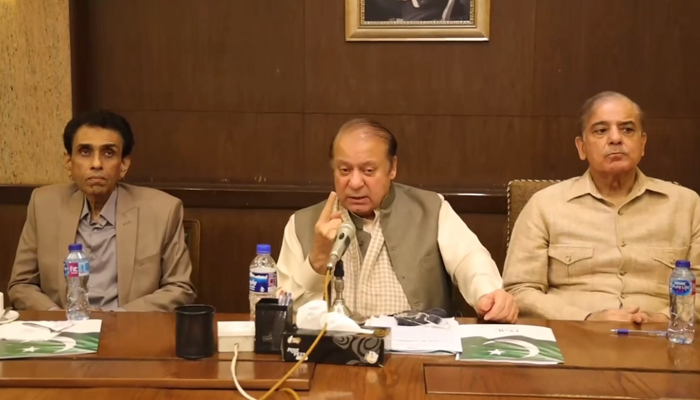Elections and alliances
Elections bring together strange bedfellows, odd couples, bad breakups. We have entered that phase in our electoral journey now, with parties making, breaking and wishing alliances. In a new twist, now the PML-N and MQM-P have announced to contest the February 8 polls jointly. The PPP co-chair, Asif Ali Zardari, has “welcomed” this electoral alliance and said that his party will face political opponents in the elections. Political observers have pointed out that after the recent rifts between the PPP and the PML-N, it was all but inevitable that the PML-N would form an alliance with the MQM-P in Sindh. In fact, it is quite possible that the JUI-F and the Grand Democratic Alliance (GDA) may also form an electoral alliance with the PML-N and MQM-P in the next few weeks against the PPP in Sindh. While observers say that this alliance will not dent the PPP’s seats much in a province the party has ruled for the last 15 years, the ‘absence’ of the PTI will add some additional seats for the PML-N-led alliance as the MQM-P has more to gain due to the minus-PTI factor.
Some have taken this alliance to be a message that some powerful quarters have given a green signal to this alliance as a message of sorts to the PPP. After the May 9 incidents, the PPP was quick to recruit PTI members, particularly in southern Punjab, but soon its plans were thwarted when Jahangir Tareen launched his Istehkam-e-Pakistan Party (IPP). The PPP reportedly saw this move as being ‘cut to size’ by power-brokers. This is why the PML-N alliance with the MQM-P will also be seen in this context. But there are those who feel that it may also be the PML-N wanting to finally hold some sway in Sindh, where the party has hardly had any presence in the last two decades.
Sindh is not the only province seeing political back and forth. The Balochistan Awami party (BAP) has also elected its new president, a move that many see as a sign that it is here to stay for the time being – and may also be easily trotted out for ‘help’ in the centre whenever the need arises. As with all politics, Pakistan’s politics too has been a master of the art of the possible – though in our case we seem to be banking on the miraculous or the impossible a lot more recently. Parties miraculously get formed and just as miraculously get disbanded. As do ‘politicians’. Which may be why the experience and sheer will that Nawaz Sharif and Asif Ali Zardari bring to the table is both comforting for their supporters and perhaps frightening for their many many detractors. Nawaz and Zardari are two of the oldest and more experienced leaders in the country and, while they may not see eye to eye on many issues, they have over the years not been averse to strategizing together. There were rumours that Nawaz Sharif and Asif Zardari spoke over the phone on Monday but both parties denied the news. Despite the denials, there have been instances in the past where not much news has come out after phone calls and even meetings between the two senior leaders. In recent months, and especially after the May 9 incidents, the two political parties have grown apart despite being key members of the PDM-led government that ruled the country for 16 months. Now that elections are near, the PPP feels that the PML-N has been given a clear edge due to the ouster of Imran Khan from the political arena. Regardless of the nitty-gritty of power plays in the country, on one thing the PPP is right: the elections should be free and fair, and a level-playing field should be given to all political parties.
-
 All You Need To Know Guide To Rosacea
All You Need To Know Guide To Rosacea -
 Princess Diana's Brother 'handed Over' Althorp House To Marion And Her Family
Princess Diana's Brother 'handed Over' Althorp House To Marion And Her Family -
 Trump Mobile T1 Phone Resurfaces With New Specs, Higher Price
Trump Mobile T1 Phone Resurfaces With New Specs, Higher Price -
 Factory Explosion In North China Leaves Eight Dead
Factory Explosion In North China Leaves Eight Dead -
 Blac Chyna Opens Up About Her Kids: ‘Disturb Their Inner Child'
Blac Chyna Opens Up About Her Kids: ‘Disturb Their Inner Child' -
 Winter Olympics 2026: Milan Protestors Rally Against The Games As Environmentally, Economically ‘unsustainable’
Winter Olympics 2026: Milan Protestors Rally Against The Games As Environmentally, Economically ‘unsustainable’ -
 How Long Is The Super Bowl? Average Game Time And Halftime Show Explained
How Long Is The Super Bowl? Average Game Time And Halftime Show Explained -
 Natasha Bure Makes Stunning Confession About Her Marriage To Bradley Steven Perry
Natasha Bure Makes Stunning Confession About Her Marriage To Bradley Steven Perry -
 ChatGPT Caricature Prompts Are Going Viral. Here’s List You Must Try
ChatGPT Caricature Prompts Are Going Viral. Here’s List You Must Try -
 James Pearce Jr. Arrested In Florida After Alleged Domestic Dispute, Falcons Respond
James Pearce Jr. Arrested In Florida After Alleged Domestic Dispute, Falcons Respond -
 Cavaliers Vs Kings: James Harden Shines Late In Cleveland Debut Win
Cavaliers Vs Kings: James Harden Shines Late In Cleveland Debut Win -
 2026 Winter Olympics Snowboarding: Su Yiming Wins Bronze And Completes Medal Set
2026 Winter Olympics Snowboarding: Su Yiming Wins Bronze And Completes Medal Set -
 Trump Hosts Honduran President Nasry Asfura At Mar-a-Lago To Discuss Trade, Security
Trump Hosts Honduran President Nasry Asfura At Mar-a-Lago To Discuss Trade, Security -
 Cuba-Canada Travel Advisory Raises Concerns As Visitor Numbers Decline
Cuba-Canada Travel Advisory Raises Concerns As Visitor Numbers Decline -
 Anthropic Buys 'Super Bowl' Ads To Slam OpenAI’s ChatGPT Ad Strategy
Anthropic Buys 'Super Bowl' Ads To Slam OpenAI’s ChatGPT Ad Strategy -
 Prevent Cancer With These Simple Lifestyle Changes
Prevent Cancer With These Simple Lifestyle Changes




